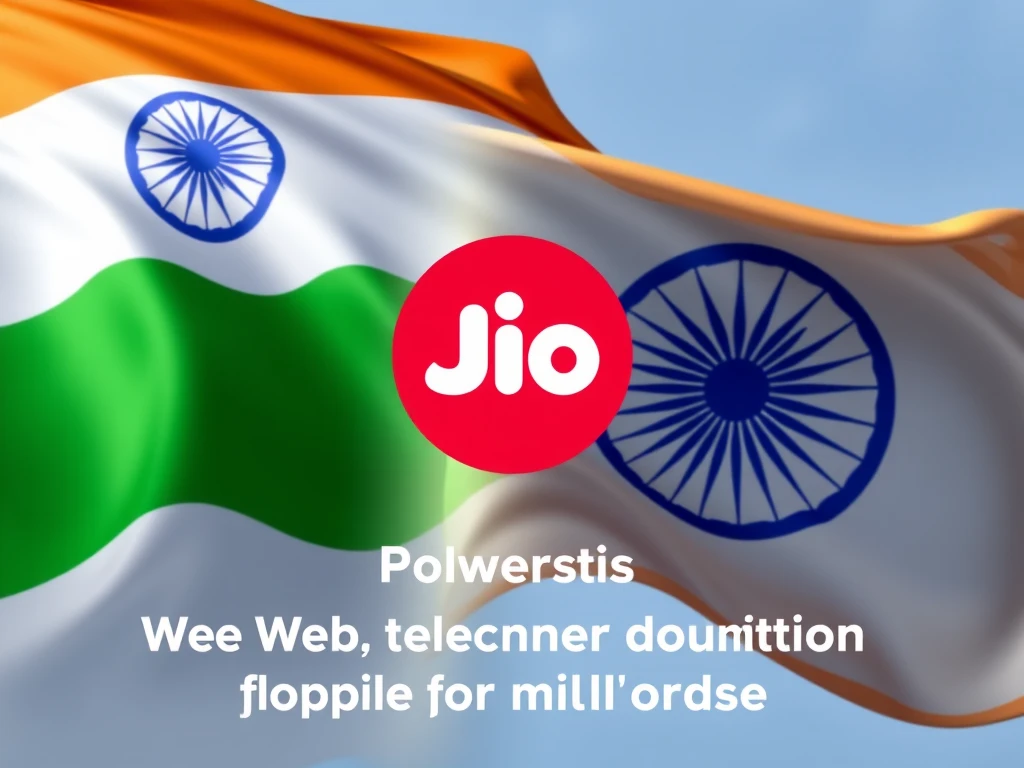Revolutionary Polygon-Jio Alliance: Unleashing Web3 Adoption for 450M Indian Users

In a groundbreaking move poised to redefine the digital landscape of India, Polygon, a leading blockchain platform, has announced a strategic partnership with telecom giant Reliance Jio. This alliance is not just another tech collaboration; it’s a revolutionary step towards mainstream Web3 adoption, potentially impacting a staggering 450 million users across India. Imagine a future where accessing decentralized applications and experiencing the power of blockchain technology is as seamless as using your everyday mobile services. This is the vision Polygon and Jio are bringing to life.
Driving Web3 Adoption in India: The Polygon-Jio Partnership
Sandeep Nailwal, co-founder of Polygon, revealed that this collaboration with Mukesh Ambani’s Reliance Jio aims to integrate blockchain technology into Jio’s extensive web services. This isn’t about theoretical possibilities; it’s about solving real-world problems for hundreds of millions of users. The initial focus is on enhancing the JioSphere web browser with blockchain-based capabilities. Why is this significant? Because traditionally, implementing such features would be incredibly complex, costly, and time-consuming. Blockchain offers a more efficient and secure alternative.
Why This Partnership Matters for Web3 Adoption?
- Massive User Base: Jio boasts over 450 million users in India. Introducing blockchain to this user base instantly creates a massive onramp for Web3.
- Real-World Applications: The partnership is focused on developing use cases that resonate with everyday users, making blockchain relevant and accessible beyond just crypto enthusiasts.
- Seamless Integration: By embedding blockchain into existing Jio services like JioSphere, the technology becomes less intimidating and more user-friendly for the average person.
Polygon’s Core Focus: Scalability and Decentralization in India
While aggressively pursuing growth and partnerships, Polygon remains committed to the foundational principles of blockchain. Nailwal emphasized that scalability and decentralization are not mutually exclusive. Polygon’s strategy in India is to strike a balance, ensuring speed and affordability without sacrificing the core values of security, transparency, and decentralization. This commitment is crucial for building trust and long-term sustainability in the Web3 space.
Investing in Zero-Knowledge Technology for Scalable Blockchain Solutions
To achieve seamless scalability, Polygon is making substantial investments in zero-knowledge (ZK) technology. This technology is pivotal in making blockchain transactions faster and cheaper without compromising security or decentralization. Think of it as making the blockchain highway wider and faster, allowing more traffic to flow smoothly. For developers and users in India, this translates to a better, more efficient Web3 experience.
Real-World Use Cases: Beyond the Hype of Web3
Nailwal highlighted that the focus is shifting from abstract blockchain discussions to tangible, real-world problem-solving. This approach is critical for driving the next wave of Web3 adoption. Consider these potential applications:
| Use Case | Benefit |
|---|---|
| Digital Identity Verification | Secure and tamper-proof identity management for Jio users. |
| Supply Chain Tracking | Enhanced transparency and efficiency in Jio’s vast supply chain network. |
| Loyalty Programs | Blockchain-based loyalty points for Jio services, offering greater security and flexibility. |
| Secure Data Management | Protecting user data with blockchain’s inherent security features. |
Polygon’s Scalable Infrastructure: No Compromise on Fundamentals
Nailwal confidently stated that developers working within the Polygon ecosystem will never have to compromise on the fundamental strengths of blockchain. Polygon’s infrastructure is designed to scale effectively without sacrificing the very essence of what makes blockchain powerful and trustworthy. This robust foundation is essential for supporting the massive scale of Web3 adoption anticipated in India through the Jio partnership.
Addressing Misinformation and Building Trust with Blockchain
In an era of rising concerns about deepfakes and misinformation, blockchain technology offers a potent solution. Nailwal pointed out that the growing demand for trusted sources will naturally drive the adoption of blockchain-based verification tools. The immutable nature of blockchain makes it ideal for ensuring the authenticity and integrity of information, combating the spread of false narratives. This is particularly relevant in a diverse and information-rich market like India.
The Power of Prediction Markets: Polymarket’s Role in Web3
Nailwal also emphasized the increasing relevance of Polymarket, a cryptocurrency-based prediction market built on Polygon, in mainstream finance and journalism. He believes that prediction markets are proving to be invaluable tools for various sectors, including finance, risk assessment, journalism, and even governance. Their ability to aggregate insights from diverse sources often leads to more reliable forecasts than traditional polling methods. This highlights another practical and impactful application of blockchain technology facilitated by Polygon.
Conclusion: A Decentralized Future for Billions, Driven by Polygon and Jio
Ultimately, the Polygon-Jio partnership is about more than just technology. It’s about building a decentralized future that billions of people can actually use. While the challenge is immense, the potential impact is even greater. By focusing on real-world applications and leveraging Polygon’s scalable and secure infrastructure, this alliance is set to drive Web3 adoption to unprecedented levels in India and potentially serve as a model for global blockchain integration. The journey towards a truly decentralized digital world is taking a giant leap forward, powered by the collaborative force of Polygon and Jio.









